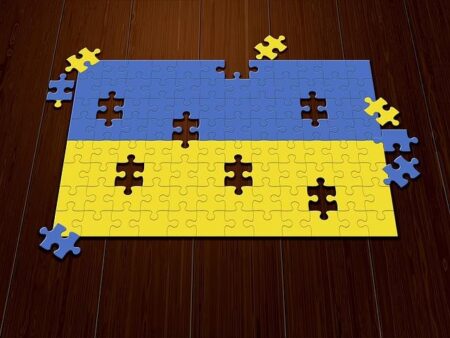France has officially linked the recent vandalism of the Paris Holocaust Memorial to a sophisticated Russian hybrid warfare network, according to UNITED24 Media sources. Authorities believe the attack is part of a broader strategy to destabilize European societies through covert operations combining cyber tactics, disinformation, and symbolic acts of provocation. This development underscores growing concerns about the extent of Russian influence campaigns targeting Western cultural and historical institutions.
France Connects Paris Holocaust Memorial Vandalism to Russian Hybrid Warfare Tactics
French authorities have unveiled a startling link between the recent vandalism of the Paris Holocaust Memorial and an extensive Russian hybrid warfare strategy aimed at destabilizing Western societies. Investigations reveal that the defacement was not a random act of vandalism but rather a calculated move within a broader disinformation and psychological operations campaign orchestrated by pro-Kremlin actors. These operations exploit historical wounds and social divisions, amplifying tensions through coordinated online and offline efforts.
Key Indicators Identified in the Investigation Include:
- Use of propaganda narratives echoing Kremlin disinformation themes
- Coordinated social media amplification by bot networks targeting European audiences
- Linkages to known Russian-backed proxy entities involved in previous cultural and political sabotage
| Aspect | Details |
|---|---|
| Target | Paris Holocaust Memorial |
| Modus Operandi | Symbolic vandalism tied to online misinformation |
| Purpose | Social division and historical distortion |
| Responsible Network | Russian hybrid warfare proxies |
Experts Detail Methods Used by Russian Networks to Fuel Disinformation and Social Discord
Recent investigations reveal that Russian disinformation campaigns are intricately designed to exploit societal tensions and amplify discord across Western democracies. These networks employ a multi-pronged approach combining traditional propaganda with digital innovations, including artificial amplification via bot armies, coordinated trolling efforts, and the strategic seeding of false narratives on social media platforms. Their tactics frequently target sensitive historical and cultural symbols, as evidenced in the recent vandalism of the Paris Holocaust Memorial – an act linked to a broader hybrid warfare strategy aiming to undermine national unity and erode public trust in institutions.
Key methods employed by Russian networks include:
- Weaponized Misinformation: Deliberate distortion or fabrication of facts tailored to inflame specific community grievances.
- False Flag Operations: Orchestrating events or actions that sow confusion about the true perpetrators.
- Amplification Through Bots and Fake Accounts: Mass dissemination that ensures visibility far beyond organic reach.
- Exploitation of Historical Memory: Targeting culturally significant landmarks to provoke emotional and political backlash.
| Technique | Purpose | Example |
|---|---|---|
| Bot Networks | Artificially inflate contentious narratives | Hashtag hijacking on Twitter |
| False Flag Events | Mislead public about real sources | Vandalism linked to remote actors |
| Propaganda Videos | Visually persuasion and fear-mongering | Circulated doctored images of memorials |
Authorities Urge Enhanced Cybersecurity Measures and International Cooperation to Counter Hybrid Threats
Authorities across Europe are calling for strengthened cybersecurity frameworks as investigations link recent acts of vandalism at the Paris Holocaust Memorial to a complex Russian hybrid warfare network. These attacks are not isolated incidents but part of a broader strategy involving disinformation, cyber intrusions, and physical provocations designed to destabilize democratic institutions and fracture societal cohesion. Security experts emphasize that addressing such threats requires a multi-layered approach, combining robust technological defenses with enhanced intelligence sharing among national agencies.
International cooperation is rapidly becoming indispensable in countering these hybrid tactics. Officials propose measures including:
- Joint cybersecurity task forces to monitor and respond to cross-border threats in real time
- Unified information-sharing platforms to improve transparency and rapid dissemination of threat intelligence
- Standardized protocols for emergency response to coordinate actions following incidents involving cyber or physical hybrid attacks
| Measure | Objective | Expected Outcome |
|---|---|---|
| Cybersecurity Task Forces | Enhance rapid response capability | Reduced attack impact and containment |
| Information-Sharing Platforms | Improve cross-border intelligence flow | Faster threat detection and mitigation |
| Emergency Response Protocols | Coordinate multi-agency actions | Streamlined incident handling and recovery |
Key Takeaways
As investigations continue, officials emphasize the broader implications of the Paris Holocaust Memorial vandalism, framing it within the scope of hybrid warfare tactics aimed at destabilizing Western democracies. The alleged connection to a Russian hybrid warfare network underscores the complex and evolving nature of information and influence operations targeting symbolic sites. Authorities vow to strengthen protective measures around cultural landmarks while coordinating internationally to counter such corrosive campaigns. UNITED24 Media will keep monitoring developments in this unfolding story.




